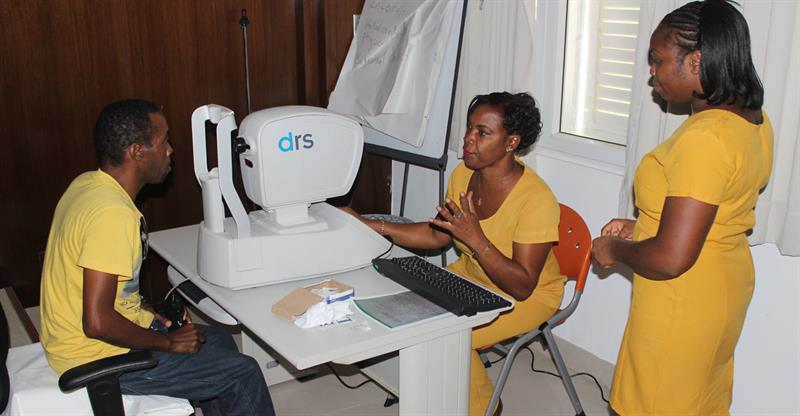THE "RIGHT TO SIGHT" PROGRAM TRAINED HEALTH WORKERS IN DIABETIC RETINOPATHY CONDITIONS.
 Saint Lucians will soon receive diabetic retinopathy services under the Vision 20/20 LINKS Program, "The Right to Sight.” The program provides equipment and training for screeners, graders, and laser treatment to address diabetic retinopathy conditions.
Saint Lucians will soon receive diabetic retinopathy services under the Vision 20/20 LINKS Program, "The Right to Sight.” The program provides equipment and training for screeners, graders, and laser treatment to address diabetic retinopathy conditions.
Diabetic retinopathy, also known as diabetic eye disease, is a medical condition in which damage occurs to the retina due to diabetes and is a leading cause of blindness in up to 80 percent of people living with diabetes for 20 years or more. The Ministry of Health in collaboration with the London School of Hygiene and Tropical Medicine, and Frimley Park Hospital in the United Kingdom, have embarked on the implementation of a diabetic retinopathy program within the public health sector in Saint Lucia.
Funded by the Queen Elizabeth Diamond Jubilee Trust Fund, a team of eight UK experts in Ophthalmology conducted a two-day training workshop with health officials to identify and address diabetic retinopathy conditions. Marcia Zondervan is the program manager for the VISION 20/20 LINKS program.
"We will be teaching screeners from both the north and the south how to identify diabetic eye disease and how to treat it. The prevalence is much higher in the Caribbean than it is in Africa, so the need then becomes much greater and when very little is done it just augments and leads to blindness. We should not be having blindness from Diabetic Retinopathy we should be able to prevent it."
Medical Officer for Health, Dr. Sharon Belmar-George, explained the importance of this program and when full implementation could be expected.
"Presently we do not provide laser treatment for Diabetic Retinopathy within our public health system. So, we've been working closely with those specialists to set up a program here and we're hoping to commence in February of 2018. Today, we're doing an intensive training to ensure that the staff members are able to do a review of all of our patients and to ensure the different steps and to pick up in an early stage any possible complications of the eye. Presently quite a few of our patients when they do need it they have to travel overseas for care. So, we are working that early in the year we could commence implementation of the program.”
The lead trainer for this workshop and Consultant Ophthalmic Surgeon at Frimley Health and NHS Foundation Trust, Professor Geeta Menon, was very impressed with the participants of the workshop and explained the difference between screeners and graders.
"Screeners are the people who are taking the pictures and graders are the people who are grading the image to decide which patients need to be sent urgently for treatment and which patients need to come back for an annual review. And, the enthusiasm of the team of both screeners and graders has been absolutely amazing. It's been a real pleasure to actually teach them. To just give you a gist, they actually have no idea of ophthalmology at all. So they don't work in ophthalmology clinics but the way they have picked up all the knowledge we have disseminated in the last two days and run with it. It has been just absolutely amazing."
At the end of the workshop, participants were tested on their ability to screen and grade images upon which they were presented with certificates, certifying them as screeners and graders for the diabetic retinopathy program in Saint Lucia.
Training in laser treatment was also provided to Consultant Ophthalmologist, Dr. Dara Bert, during the sessions which began on Dec. 11. The laser equipment and specialized cameras were all supplied under the grant funding.
The Vision 20/20 LINKS Program is an initiative of the World Health Organization and the International Agency for the Prevention of Blindness, that work to eliminate avoidable blindness worldwide.